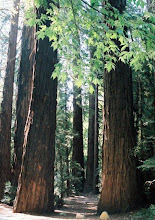Trees are a treasure; especially on the wide prairies of the Great Plains. Even from a long distance, you can tell where a homestead is or was by noticing the cluster of trees. Settlers planted them to form a shelter around the house and yard from the worst of the cold winds. That's why you find evergreens scattered in windbreaks; they give shelter from blowing snow and frigid winds when the other trees have lost their leaves. Fruit trees were planted for preserving and canning to enrich diets even in the winter.
You can see the curly paths of the rivers by following the tree line growing along the banks. It's often at the curve of a stream or small river where the water slows down that you will find a large willow tree hanging over the water. In dryer areas of the plains, you can see where water only runs during the flashes of thunder storms by looking for the trees. It's not only dryer in the west, but the wind blows harder with nothing to get in it's way. The power of the wind and the lack of moisture shows in the shortened and twisted trees but still, they grow where there is water. In western Kansas, where trees and water are in shortest supply and limestone is plentiful, farmers and ranchers are inventive, cutting the limestone and using it for the mainstays of fence lines. It's why that area is called "stone post" country.
In Psalm 1, the writer compares faithful people to "trees planted by streams of water, which yield their fruit in its season, and their leaves do not wither" (Psalm 1:3). These are people who "delight ... in the law of the Lord" and who meditate day and night.
This night seem strange if we only consider "the law of the Lord" to be like the 10 commandments. How do you "delight" in being told what to do and what not to do? But the psalmist is talking about so much more than those few verses in Exodus 20. What is being modeled in the psalm is following the will of God; shaping one's life by faith. And like the tree planted by the water, our faith is fed by hearing, reading, studying, and praying the Word of God. As we nurture our faith, we grow stronger and more able to withstand the storms and winds of life; even the dry times when we are not sure of our faith or when we are battered by pain or crisis. It is at those times most of all, when the community of the church can uphold us.
The tallest largest trees of all, the redwoods, have very shallow roots. I have read that if they grew alone, they would not be able to grow so tall or so old because they would tear out of the ground and fall over in wind. However, as they grow in groves, their roots intertwine and weave together, giving them a huge base much larger and stronger than any one or two could grow. It is because they grow together that they are able to become the monuments they are.
It is the same for us. When we grow our faith in community with others, we are better able to handle whatever it is that blows our way. Read Ephesians 4: 1-6

No comments:
Post a Comment